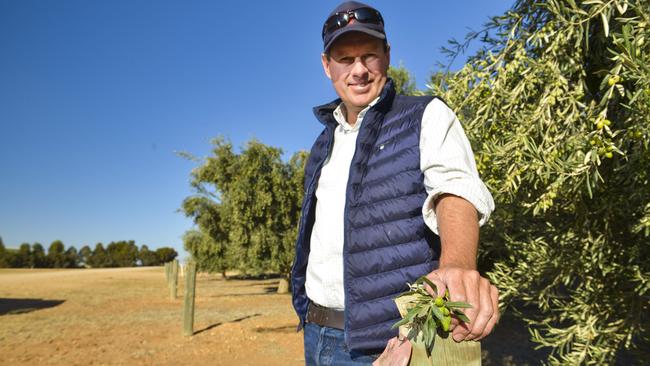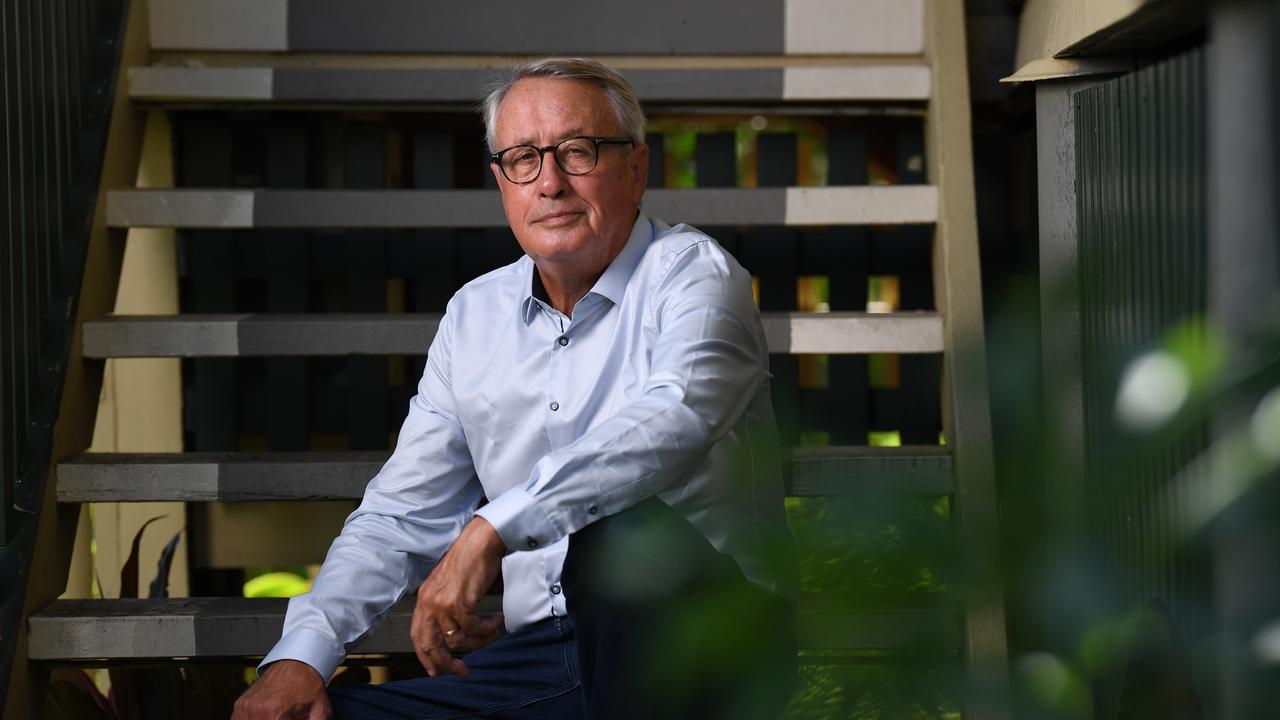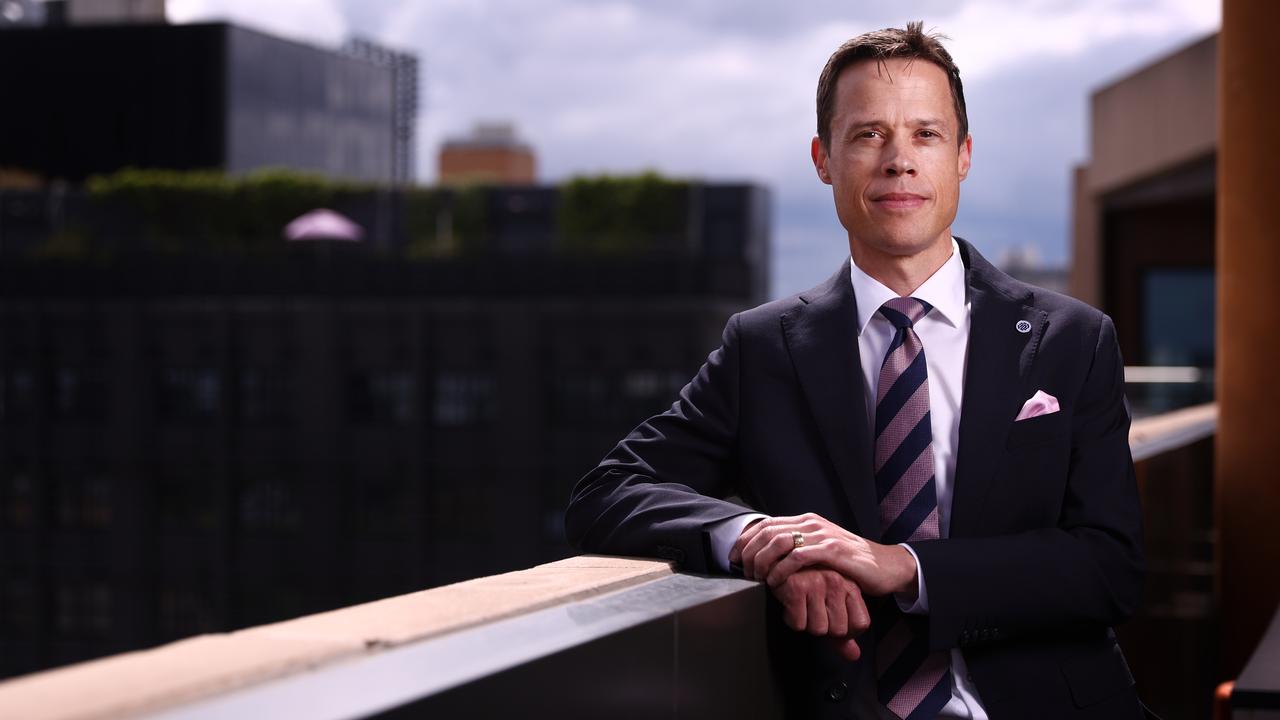Olive grower reaps health rewards
Boundary Bend Olives is branching out into wellness products with brands of olive leaf extract and olive leaf tea.

Olive groves extend as far as the eye can see as you descend towards the dusty gravel airstrip at the Boundary Bend Olives property, home to Australia’s most famed extra virgin olive oil, Cobram Estate.
The 3500 hectares of neatly ordered trees situated midway between Mildura and Swan Hill in northwestern Victoria are encircled by kilometres of red earth and mallee scrub.
Since mid-2014 these panoramic views have been enjoyed at least once a year by the most notable of Boundary Bend’s 500 shareholders, ex-waterfront boss and businessman-turned agribusiness investor Chris Corrigan.
“He is really engaged and any time that I can’t make up my mind about stuff he is terrific to talk to. He is always willing to pick up the phone,” Rob McGavin, co-founder and chief executive of Boundary Bend, tells The Weekend Australian of Corrigan, who at harvest time has visited the property with his family in tow.
“He comes to our shareholder days and is genuinely interested in what we are doing and how we are doing it.
“So I think we are all the better for having Chris as a shareholder in the business. He is terrific.”
Corrigan, the former chief executive of stevedoring group Patrick Corporation — who now spends much of his time offshore, often in Italy — is also an investor in listed agricultural company Webster. Patience, McGavin says, is his virtue.
“What I have respected most is that he is here for the long term, which is quite unique. Quite a lot of people want success tomorrow and sell the next day and keep churning, whereas his philosophy right from the beginning was ‘I am patient, there will be ups and downs, but if you keep doing things well you will, overall, do well.’ Just his patient capital is exactly what this business needs,” McGavin says.
Having patient investors has been central to the success of the business McGavin co-founded with businessman Paul Riordan in 1997. Their first trees were planted in 1999. Boundary Bend now produces about 65 per cent of Australia’s olive oil from its 2.5 million trees. Over the years the property has hosted big-name celebrities and wealthy investors including billionaire Seven Network owner Kerry Stokes and his wife Christine, who once visited with legendary Better Homes & Garden Magazine editor Julia Zaetta.
Its highlight for food-lovers is “The Shack”, a renovated, corrugated iron-encased tasting and dining room complete with its own kitchen, outdoor wood-fired grill and an elevated gazebo with views over the groves.
For three months of each year at harvest time, guests can savour gourmet lunches prepared by Cobram Estate’s chef-at-large, American Kevin O’Connor.
Guests are served Boundary Bend shiraz, the product of a legacy vineyard on the site that is bottled exclusively for staff who can buy it at cost price.
While Cobram’s flagship oils are the centrepiece of the tasting room, it also displays products of an emerging wellness business owned by Boundary Bend known as Wellgrove, which came about after McGavin and his team set up a laboratory to test how it could extract value from its olive oil waste stream, which he says contains important antioxidants.
“We started by looking at what was in the olive leaf extract and could we extract it cost-effectively and was there a market for it. That was the first part of the research, then we went into the lab and then commercial-style trials,” he says.
The company has spent about $16 million over five years to research and develop its own brands of olive leaf extract and olive leaf tea, now available through the Chemist Warehouse pharmacy chain and Coles supermarkets.
“We have also worked out how to preserve the antioxidants that are in the fruit as well. Those are different to the leaves,” McGavin adds. “So there are a number of other products which are in the pipeline that I think are quite exciting.”
He now believes Wellgrove can be more profitable than his core business in five years’ time.
Wellgrove already has an online strategy in the US and McGavin believes its products will be highly sought-after in Asian markets. But Australia initially remains the focus.
“You have to get it right in your own backyard first because there is a lot of competition in China and everyone is there trying to market something,” he says.
“We feel if we get a good base here it gives you more credibility and gives you more confidence.”
The push into the wellness category has not come at the expense of the core business. Halfway through this year’s harvest, McGavin says it is looking like a bumper crop, a relief after frost impacted last year’s haul.
Boundary Bend, which turns over more than $80m, posted an after-tax loss for 2018 of $13.28m, compared with the 2017 profit of $12.83m.
“We all understand that things don’t always go well but as long as what you are doing is creating long-term value, you don’t worry about the short-term hiccups. You learn from them and move on,” McGavin says, noting the firm has now invested in a number of frost fans.
The Australian business is now expected to generate an average EBITDA of around $55m per year in 2019 and 2020, up from $12.07m in 2018 and $46.5m in 2017.
Price rises of around 15 per cent have been secured from all major customers.
Cobram Estate achieved retail sales of just over $78m in 2018, making it the number one selling retail brand of extra virgin olive oil in Australia by every measure, with market share of 40 per cent.
In 2015, Boundary Bend expanded into America, establishing a production facility in the Californian town of Woodland, near Sacramento.
It is now the third largest processor and marketer in the US of American-produced olive oil.
Although McGavin and his team are now enjoying success, it has been a labour of love over two decades.
For years McGavin regularly flew his own light plane from his home at Renmark in South Australia to Boundary Bend to develop the site.
He now uses it to fly from his home at Lara near Geelong to his family’s farm near Longreach in Outback Queensland.
During the GFC his company was on its knees after purchasing almost 6000 hectares of olive groves from Timbercorp, when it went into administration and then liquidation in 2007.
McGavin and Riordan had to sell their irrigation reserves just to keep their bankers at bay.
A key innovation in recent years has been the introduction of mechanised picking by giant, aptly named “Colossus” harvesters with chaser bins that slowly trundle over each row of olive trees.
Each machine has 750 picking rods designed in a rotary formation which make the whole tree shudder and the olives drop onto a conveyor below.
They pick five tonnes of olives per hour, compared to about 250 kilos a day from a human picker.
During harvest the machines run 24 hours a day in two 12-hour shifts. They are often operated by grey nomad workers who return to the nearby blink-and-you-miss it town of Boundary Bend each year to camp in the caravan park and earn spare cash on the olive farm.
McGavin is now working on a project to double the efficiency of the harvesters.
The olives are crushed on site and the oil stored in pristine conditions to keep it fresh and bottled just in time for the consumer. A maximum of only four weeks’ worth of stock is held in reserve.
McGavin’s key public message in recent years has been to highlight the health and quality issues associated with his biggest adversaries: cheap European imports of low-quality olive oil.
“Consumers need to know that extra virgin olive oil can come from places other than Italy, that fresher is better, that the health benefits of the antioxidants are clear and that most or a lot of extra virgin olive oil is mis-labelled or not real,” he says.
In April 2018 Boundary Bend raised $25m in fresh equity from its shareholders to fund grove and processing expansions in Australia and the US.
McGavin says for the moment, it does not need any more. Raising additional equity has always come at the risk of diluting shareholders like Corrigan. But they seem prepared to play the long game.
“We are a capital intensive business, but it is an efficient business because the spending is pretty discretionary,” McGavin says.
“We can turn it off if we are short of money and we don’t need to spend it.”
Damon Kitney visited the Boundary Bend Olives property courtesy of Boundary Bend.


